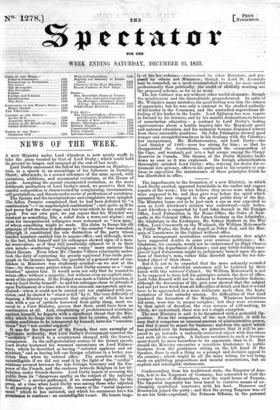NEWS OF THE WEEK.
A NEW Ministry under Lord Aberdeen is now nearly ready to take the place vacated by that of Lord Derby; which could hold its ground no longer, and resigned at the end of last week.
Lord Derby announced the all of his Government on Monday,— first, in a speech to an assemblage of his followers in Downing Street ; afterwards, in a second utterance of the same speech, with omissions, additions, and ornamental variations, at the House of Lords. Accepting the second ornamented recitation, as the more deliberate production of Lord Derby's mind, we perceive that the careful composition is characterized by complaining, incrimination, self-gratulation, and threats under cover of professions of assistance. The threats and the incriminations and complaints were mingled. The fallen, Premier complained that he had been defeated by "a -combination "—" an unprmcipled combination " ; and spoke as if he had never had the clear stage and fair trial which he has really en- joyed. For our own part, we can repeat that his Ministry was received as something like a relief from a worn-out regime; and even his inexperienced colleagues were welcomed as "new men," of whom something might be made. His claim to forego his old principle of Protection in deference to "the country " was conceded, although it constituted the sole distinction of the party whose banded numbers enabled him to assume office ; and although, down to the last, both himself and his colleagues showed signs of a men- tal reservation, as if they 'still jesuitically adhered to it in their own minds—scattering "ambiguous voices" more ominous than direct threats. Even when Mr. Charles Villiers reluctantly under- took the duty of correcting the grossly equivocal Free-trade para- graph in the Queen's Speech, the question of a general want of con- fidence in Ministers was studiously avoided—as we saw at the time—by those same parties whom Lord Derby accuses as a "com- bination" against him. It would seem not only that he wanted to retain office without a majority, but without even an explicit state- ment of hie intention. If the Budget was made a Cabinet question, it was by Lord Derby himself: he and his colleague chose to obtrude it upon Parliament at a time when it was unusual, unexpected, and un- desired—when it could not be carried out nor explained with pre- cision ; and he elected to" stand or fall" by it. The very difficulty of framing a Ministry to represent that majority at which he now rails with a use of epithets borrowed from party slang, most un- usual in a First Minister, proves that there could have been no combination at all. And, complaining of predetermined resistance against himself, he departs with a significant threat that the Min- istry which he drags into the vacuum that he creates shall, under certain conditions to be interpreted by himself, have his " conscien- tious " but "not cordial support."
It was for the Emperor of the French, that rare exemplar of legitimate authority, that Lord Derby's Government reserved the " cordiality " denied to a countryman charged with the Queen's commission. In the self-gratulatory section of his formal speech, Lord Derby bestowed his warmest encomiums on Lord Malmes- bury, whom he described as having "extorted applause and ad- miration " and as having left our foreign relations in a better con- dition than when he entered office. The assertion would be unintelligible if we did not read it by the light of the " cordial " relations avowed between the late Foreign Secretary and the Em- peror of the French, and the coolness towards Belgium in her ta- bulation under French threats. Lord Derby boasts of arousing the public from its "dangerous apathy on the subject of the national defences " : a service performed, if we remember rightly, by the Press, at a time when Lord Derby was among those who objected to all mooting of the question. Ha boasts of the "social improve- ment" which he has initiated, and which his successors have his Permission to continue : an unintelligible vaunt. He boasts large-
ly of his law reforms,—commenced by other Ministers, and pre- pared by others not Ministers; though to Lord St. Leopards may be conceded, as a most accomplished lawyer, far more useful professionally than politically, the credit of skilfully working out the proposed reforms, so far as he went.
The late Cabinet was not without other useful elements ; though the mischievous and the discreditable preponderated. In spite of Mr. Waltiole's many mistakes, his good feeling won him the esteem of opponents; but he was only a contrast to the studied audacity of his leader in the Commons and the unstudied supercilious ill- feeling of his leader in the Lords. Lord Egli:2ton has won repute in Ireland by his fairness, and by his manful declarations in favour of unsectarian education : a contrast to Lord Derby's boding equivocations about a hostile inquiry into the Idaynooth grant and national education, and his unmanly because disguised retreat from those untenable positions. Sir John Pakington showed good temper and straightforwardness in his dealings with the Colonies ; but inexperience, Mr. Mothercountry, and Lord Derby—the Lord Stanley of 1842—were too strong for him ; so that he disappointed the Australians, continued the exasperation at the Cape, and wantonly got into a bad serape among the Clergy Reserves in Canada. The finance of the Derby Ministry broke down as soon as it was explained. Its foreign administration thoroughly satisfied Lord Derby; who, waiving his desire for re- tirement into privacy, offers to his party and to his country to con- tinue in opposition the maintenance of those principles which he has illustrated in office.


























